HP Chromebook 11 Review
by Anand Lal Shimpi on October 15, 2013 2:45 AM EST- Posted in
- Laptops
- HP
- Chrome OS
- Chromebook
Battery Life & Charging
Chrome OS has never struck me as being particularly optimized for low power consumption. Despite using relatively power efficient hardware and being paired with a 30Wh internal battery, the Chromebook 11 barely lasted 5.4 hours in our web browsing battery life test. Local video playback was even worse at 4.8 hours.
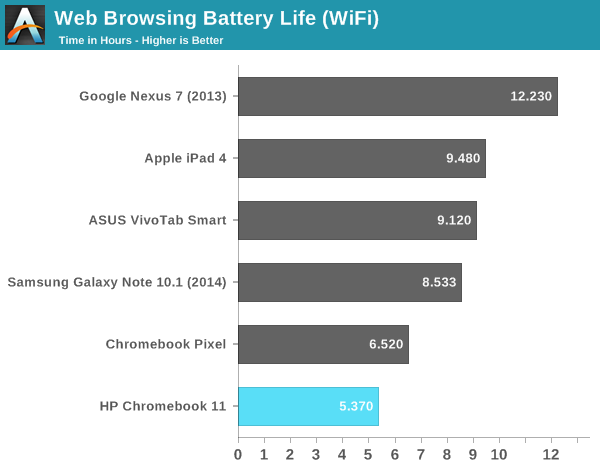
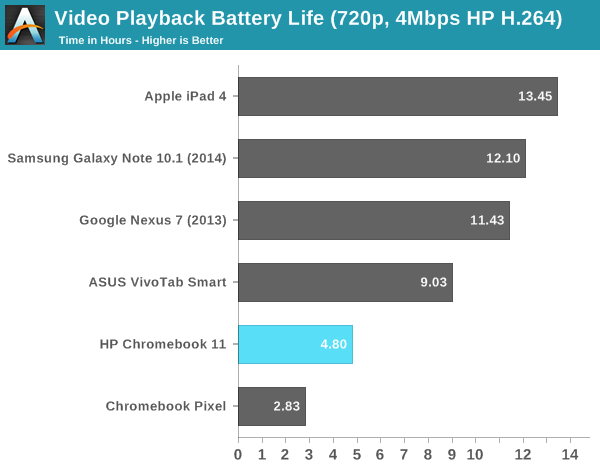
Under heavy multitasking scenarios I wouldn’t be surprised to see more significant drops in battery life as well.
Charging is the other unique aspect to the Chromebook 11. Rather than a proprietary connector to an AC adapter, the Chromebook 11 features a standard microUSB connector for power. I asked Google if the Chromebook 11 implemented the USB Power Delivery specification, designed to deliver up to 60W over microUSB, unfortunately the answer there was no. There's a 200 kΩ resistor between ground and the ID pin of the Chromebook 11's charger serving as the signal that the charger can pull more current and supply up to 15.75W over the microUSB cable/connector.
You can charge the Chromebook 11 using any microUSB cable + charger combo, although power delivery will be limited to whatever the charger supports. You’ll also get a warning under Chrome OS:
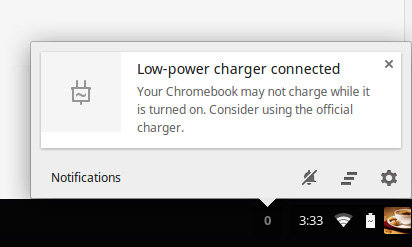
Similarly, the Chromebook 11’s charger can be used to charge other microUSB devices but only at the maximum rate supported by the device.
When connected to the Chromebook 11, the bundled charger quickly ramps up to 3A @ 5.25V after a brief period, presumably where it confirms that the attached device is capable of handling increased current delivery.
Charge time is incredibly quick thanks to the 15.75W charger. The adapter draws a maximum of 21W at the wall (just under 80% efficiency, no 80Plus certification here it seems) and can completely charge the Chromebook 11 in roughly 2.5 hours.


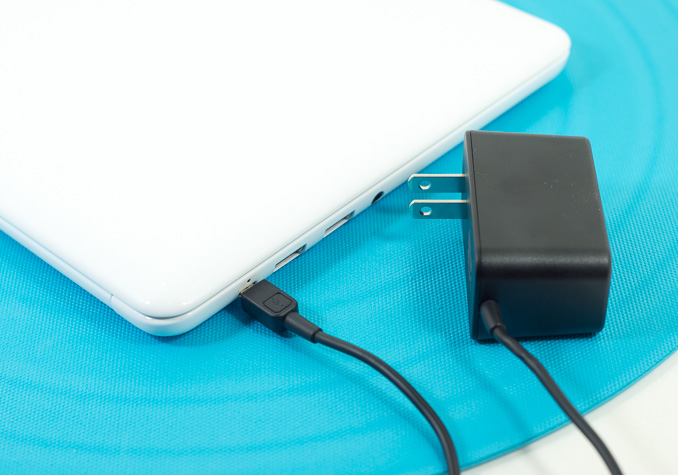
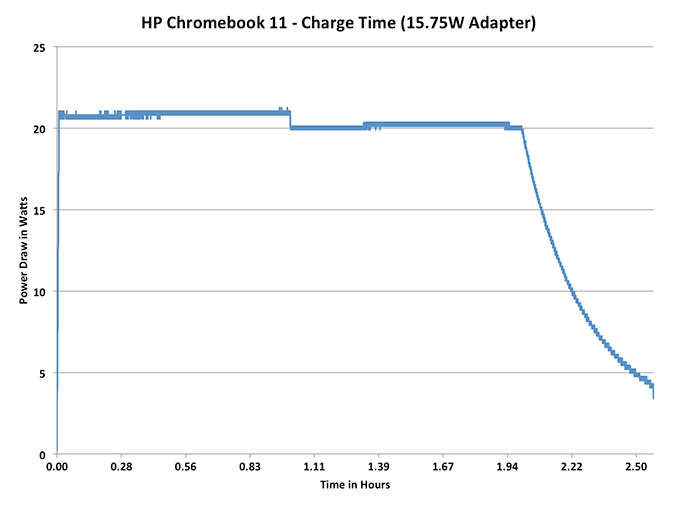








90 Comments
View All Comments
lightsout565 - Tuesday, October 15, 2013 - link
Yes, I believe you can.https://support.google.com/chromebook/answer/18310...
lightsout565 - Tuesday, October 15, 2013 - link
If only it had Bay Trail... Sigh.I was very disappointed by the batter life figures. The HP Chromebook 11 and the Asus T100 both have nearly identical battery sizes (30 Wh vs 31Wh respectively) but the Asus has a reported 11 hours of battery life. Clearly Windows 8/BayTrail just blow the ChromeOS/Exynos away when it comes to power managment.
Do you plan on reviewing the Asus T100? Thanks and awesome review!
shwetshkla - Tuesday, October 15, 2013 - link
I have a genuine question.. why don't chromebooks use amd chips?? It might further lower the costs. :/shwetshkla - Tuesday, October 15, 2013 - link
and have enough power for chromeOS.DanNeely - Tuesday, October 15, 2013 - link
The same reason AMD has such a tiny mobile share in general. Their chips need significantly more power for a given performance level.Krysto - Thursday, October 17, 2013 - link
I would go for AMD chips, if they move to 14nm FinFET, as soon as it's available in 2015 (or even next year if that Samsung 14nm chip is real for 2014, but I doubt it).epr118 - Tuesday, October 15, 2013 - link
Why didn't you have the Samsung Chromebook from last year in the comparison? You say this is the successor to it, so I would like to see how favorably/unfavorably in performs. I can assume the display and build quality are better, with the performance around the same.jaydee - Tuesday, October 15, 2013 - link
It's an interesting device, but for someone like me, who has an iPad, I don't really see much that a Chromebook can do that I can't with a tablet+bluetooth keyboard. Sure there are a few applications where you can really use the touchpad, and there are certain apps that you just can't do on a mobile OS, but going to my desktop isn't that inconvenient for those things.If you don't have a tablet already, then I can see the draw, but for a household that has a tablet, a laptop and a desktop, I'm not sure where this fits in. A real laptop is much powerful and has 90% of the mobility of a Chromebook at maybe 150% of the price (~$450 is a decent base price for a basic i3 laptop). A real tablet is much more mobile, with the same amount of power, 90% of the application at about the same price. I can maybe see this in a household that has a desktop and wants something to blur the lines between laptop/tablet at a low price point, but I don't think there's that much of a market.
kyuu - Tuesday, October 15, 2013 - link
ChromeOS is less fully featured than any OS, whether you're talking full Windows, Windows RT, iOS, or Android. It really has no reason to exist other than to push Google's cloud services.mschira - Tuesday, October 15, 2013 - link
Yea Chrome OS is an odd beast. I wonder if the same hardware with android installed would be a better choice?Then again lack of features is the point of Chrome OS. Less features means less can go wrong.
Good for grannies I guess.
M.